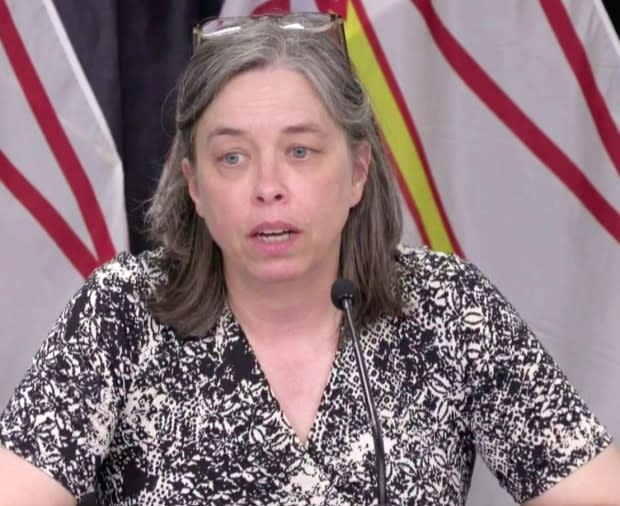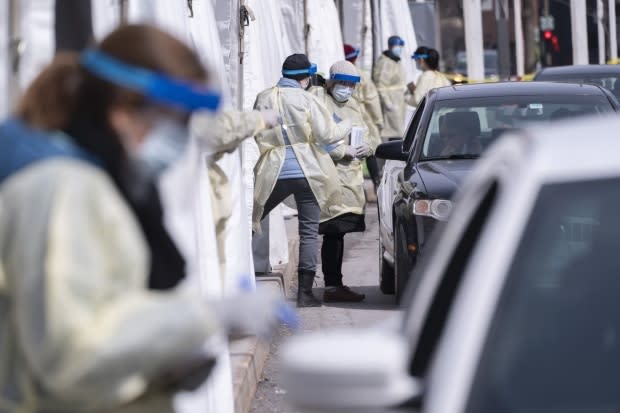Worried about the Atlantic bubble? Here's why experts say the risk is low
Today, for the first time in months, people will be able to travel around the Atlantic region without having to isolate upon arriving in a different province.
But while opening up has created opportunities for tourism, family visits, it's also causing fear for some.
After months of lockdown, some people are afraid that allowing travel will cause a spike in cases, prompting petitions and calls to keep the borders closed.
But what does the science say? Experts say the risk right now is very low.
Where could the virus come from?
Atlantic provinces shut their borders and required people to isolate for 14 days out of concern that people from areas with widespread COVID-19 could come in and spread it.
Early on, even Atlantic provinces were seeing double-digit increases in new cases.
But the situation now is very different, Dr. Janice Fitzgerald, N.L.'s chief medical officer of health, said Tuesday.
"Our decisions and choices must reflect the science, not our fears," she said.
"We have trusted the science to get us here and it has served us well."

As of Thursday, there are just six active cases in an area with 2.2 million people.
Prince Edward Island and Newfoundland and Labrador have no active cases, and have not had a new positive test in more than a month.
Nova Scotia has seen three new cases this week, but they're all people who returned from travel outside Canada, they self-isolated, and there's no sign they've spread the disease to anyone.
Even with the Atlantic bubble the requirement to isolate after international travel won't change.
New Brunswick is down to three active cases, tied to a doctor who didn't self-isolate after a quick trip to Quebec, but it's now been more than a week with no new cases, a sign that it's been contained.

"Right now the evidence, given the prevalence in those provinces, doesn't really support us keeping our borders closed, because their epidemiology is as good as ours, really," said Fitzgerald.
The plan to open up travel is backed by the officers of health in all four provinces, the same doctors who were widely praised for locking down their provinces early on in the pandemic.
Do independent experts agree?
There has been political pressure from businesses to open up, especially in the tourism sector. Could their endorsement have been influenced by the politicians they have to work with?
Independent Dr. Susan Kirkland, who heads the public health and epidemiology department at Halifax's Dalhousie University's public health and epidemiology department, says the time has come to open up.
"I think it's probably an ideal opportunity right now to be able to spread our wings a little bit and create a bubble," said Kirkland.
What about the risk from airplanes?
One of the key messages from health officials has been about the importance of keeping two metres apart from other people, something that's not possible on airplanes, especially now that WestJet and Air Canada are once again selling every seat on their planes.
But even without distancing, there hasn't been widespread transmission in airplanes.

A man who travelled from China to Toronto on Jan. 22 was infected and had a dry cough, but no one else on the 15-hour flight tested positive.
Transport Canada has required masks, which is designed to reduce the chance someone who's sick is able to expel droplets containing the virus.
The air inside airplanes is recycled every two to three minutes, and run through a HEPA filter to remove virus particles from the air.
Couldn't we open more businesses or long-term-care homes instead?
Health officials insist they haven't made a tradeoff; the restrictions remaining on visitors for long-term-care homes, for example, are needed to protect people for whom an infection can be fatal.
Fitzgerald said most businesses are now reopened, with modifications.
There are also plans underway to allow more visitation in homes.
"We are making progress on both fronts but we don't have to have one completely finished before another one can happen," she said.

What about the Quebec and U.S. borders?
Areas of the United States are still dealing with growing outbreaks, and while Quebec's numbers have decreased, they are still seeing dozens of new cases a day.
Those borders remain closed, with screening in place to make sure people can't enter.
Anyone arriving from outside Atlantic Canada will still have to self-isolate for 14 days to make sure they don't present symptoms of COVID-19
How do we stay safe?
Health officials have said physical distancing, handwashing, staying home if you're sick and keeping your personal contacts as low as possible are the best ways to ensure new cases don't become outbreaks.
They have warned there will be new cases but the system in place to detect, trace and isolate is much better than it was in March.
"It is not realistic for our province to stay closed until a vaccine comes along," said Fitzgerald.
"The realistic objective is that we will live with COVID-19."
Read more from CBC Newfoundland and Labrador


